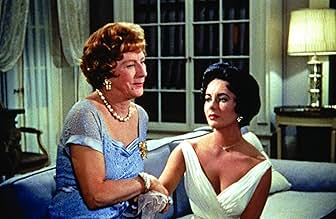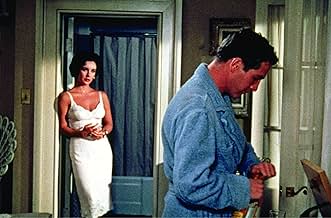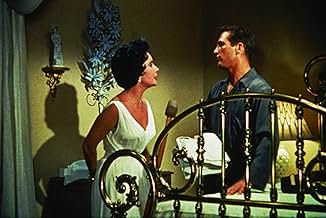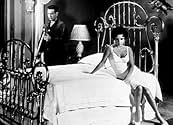Brick, ancien joueur de football américain alcoolique, boit à longueur de journée et résiste à l'affection de sa femme, Maggie. Ses retrouvailles avec son père, Big Daddy, qui se meurt d'un ... Tout lireBrick, ancien joueur de football américain alcoolique, boit à longueur de journée et résiste à l'affection de sa femme, Maggie. Ses retrouvailles avec son père, Big Daddy, qui se meurt d'un cancer, font ressurgir tout un tas de souvenirs et de révélations chez le père comme chez ... Tout lireBrick, ancien joueur de football américain alcoolique, boit à longueur de journée et résiste à l'affection de sa femme, Maggie. Ses retrouvailles avec son père, Big Daddy, qui se meurt d'un cancer, font ressurgir tout un tas de souvenirs et de révélations chez le père comme chez le fils.
- Réalisation
- Scénario
- Casting principal
- Nommé pour 6 Oscars
- 3 victoires et 16 nominations au total
- Sookey
- (non crédité)
- Boy
- (non crédité)
- Buster
- (non crédité)
- Child
- (non crédité)
- Dixie
- (non crédité)
- Pollitt Groom
- (non crédité)
- Party Guest
- (non crédité)
- Trixie
- (non crédité)
- Sonny
- (non crédité)
- Lacey
- (non crédité)
Avis à la une
Big Daddy and Big Mama both bring back fond memories of my own childhood, and if you grew up in the south, chances are you knew someone like the both of them. Their characters are written and performed so typically Southern, that I realized half way through I felt family connections with the whole family, including the no-neck monsters! Sister Girl is the sister in law from Hades, and her husband needs to dig into her purse for his...manhood. We ALL know a couple like that!
All in all? Elizabeth Taylor, Paul Newman, and Burl Ives are breathtakingly beautiful in their portrayals. This is probably not a good family movie, as Brick has a serious drinking problem and Maggie IS so desperate for his affections, and probably not a good Friday/Saturday night movie, but I still love it, and will think of it fondly for the rest of my life.
It rates an 8.8/10 from...
the Fiend :.
Three of the greatest cinematic performances placed on film.
The casting is brilliant:
Tennessee Williams's Big Daddy was indeed big - larger than life, domineering, insensitive, self-absorbed. Burl Ives's Big Daddy is larger than life, insensitive, domineering, self-absorbed. Ives is "on" every moment. And every moment is true.
Paul Newman's Brick, is as afraid of life as Big Daddy is in love with it. Yet, in his way, he's a chip off the old block - self-absorbed, insensitive.
And domineering or, as Big Daddy and Maggie would have it, masterful, ready to take charge -
if he could just get over himself.
I confess, I don't care for Elizabeth Taylor as an actress, but she is so right for the part, that I can't think of anyone else to fill it. Anyway, who else has eyes that could compete with Newman's?
Judith Anderson plays the typical Williams matron, living in her house of delusions. She's Big Daddy's tormented, desperately lonely, unloved partner, who towards the end wins Big Daddy with her nobility and devotion.
The under-appreciated Jack Carter has the unenviable role of Brick's pliant, conformist brother, Gooper, decent at heart but worn out after years of jumping through Big Daddy's hoops and still winding up on the short end, with a house full of brats, bred at Big Daddy's presumed bidding and delivered by a scheming, ambitious weasel of a wife. Gooper the only character I have a little trouble with, because his climactic speech, as rendered by Carter, is so heartfelt, that we are aggrieved with him at the injustice of Big Daddy's favoritism for the no-account but aesthetically more pleasing Brick.
Perhaps an even more unenviable role is that of Gooper's wife, played to perfection by Madeleine Sherwood. Anyone who has grown up in the South has known "Sister Woman". I can assure those who haven't, that this character is not a stereotype or caricature.
There are a few quibbles. One character, the family doctor, though played well by Larry Gates, has a dramatic function that's about as useful as the referee in a pro wrestling match, but not nearly as decorative. I guess he's included to provide plot information, but I think it could have been provided just as well without him. I was also put off by the contrived thunder claps at dramatic moments. Then, there were some continuity problems, such as different facial expression when shot angles were changed and Gooper's too many "Shut ups" to Sister Woman.
If, as another reviewer has said, Tennessee Williams hated this film, then it couldn't have been because it was untrue to his work. If he disliked the changes and omissions, he should blame '50s prudishness, not the film, for dictating, say, the suppression of Brick's homosexuality.
Williams wrote about lies and delusions, the good ones and bad ones. Well, that's what Cat on a Hot Tin Roof and Streetcar Named Desire and Glass Menagerie were all about. Tennessee Williams's stories about the South and its culture of delusion are not just rebukes of Southern hypocrisy and bloodymindedness but paeans to the gentle and genteel refuge which delusion provides. As Maggie "The Cat" says, "Truth, truth - everybody keeps hollerin' about the truth. Well, the truth is as dirty as lies."
Finally, I think it was brilliant of Richard Brooks to insist on color, for Williams's stuff is talky, and with the drabness of a typical Williams set, this can be a bit oppressive. With color, and the wonderful animation Brooks instills in all the characters, his Cat contains not a dull moment. If Brooks has given us something at odds with what Williams intended, I think he has given us something just as fine.
The film's simple story centers around a day in the life of a wealthy Southern family. With this family the key word is "mendacity". What does that even mean? Any of our characters who initially don't know about mendacity surely will by the time the story plays itself out. As we meet them everyone has come together to celebrate the 65th birthday of family patriarch Big Daddy. Initially it seems the film is about Big Daddy's son Brick and his wife Maggie the Cat. Brick and Maggie are not currently in the throes of wedded bliss. To say their relationship is strained would be putting it mildly. The fact that alcohol seems to be the only thing in life Brick is at all interested in probably does not help matters. But as the film progresses we see there is a larger issue than Brick and Maggie's troubled marriage. Big Daddy is dying. And nobody, not his family and not his doctors, has the guts to tell him. This will ultimately play itself out in powerful, heartrending fashion.
For much of the film's running time you would call it compelling but certainly not spectacular. But then Ives, as Big Daddy, grabs the film by its throat and shakes some real life into it. There's a scene where Ives as Big Daddy and Newman as Brick are alone in a basement which simply could not have been performed any better. There's so much these characters have to say to one another. The emotion is raw and the scene is so powerful. It hits you right in the heart. Just this one scene alone, with these two great actors, elevates the film all by itself. Newman is terrific. Ives is astounding. Perhaps it is in fact possible to overshadow Elizabeth Taylor. Maybe just this once. Maggie the Cat is an intriguing character in her own right and Taylor certainly doesn't disappoint in the role. But it turns out that ultimately the film is really about the relationship between Brick and his father, not Brick and his wife. And as such it is Newman, and most especially Ives, who you will most remember. It is their work which transforms a good movie into something truly memorable.
Le saviez-vous
- AnecdotesDespite being really affected by her husband Mike Todd's death, Elizabeth Taylor resumed her job in a very professional way, without any delay on the set. Everyone was astonished by her determination.
- GaffesAfter Brick tries to drive away and gets stuck, Maggie goes out to him and helps him into the house through the pouring rain. Her hair is soaking wet, but the next time she is seen, it's perfectly dry and styled.
- Citations
Harvey 'Big Daddy' Pollitt: I've got the guts to die. What I want to know is, have you got the guts to live?
- ConnexionsEdited into Hollywood: The Dream Factory (1972)
Meilleurs choix
Détails
- Date de sortie
- Pays d’origine
- Langue
- Aussi connu sous le nom de
- Un gato sobre el tejado caliente
- Lieux de tournage
- Metro-Goldwyn-Mayer Studios - 10202 W. Washington Blvd., Culver City, Californie, États-Unis(studio: made in Hollywood, U.S.A. by)
- Société de production
- Voir plus de crédits d'entreprise sur IMDbPro
Box-office
- Budget
- 3 000 000 $US (estimé)
- Montant brut mondial
- 1 872 $US
- Durée1 heure 48 minutes
- Couleur
- Rapport de forme
- 1.85 : 1
Contribuer à cette page

































